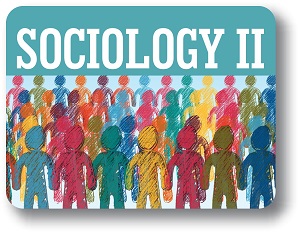
Sociology is the study of people, social life and society. The development of a sociological imagination will enable students to examine how society shapes human actions and beliefs, and how such actions and beliefs in turn shape society. Exciting online video journeys to different areas of the sociological world are also presented in the course.
Unit 1: Marriage & Family
In this unit, we will discuss the social institution of the family. We will examine different family arrangements around the world and the functions that families provide for individuals and society. We will also discuss different patterns in marriage and mate selection as well as look at how factors like race and class affect families. Finally, we will investigate the increase in divorce in North America and what factors may contribute to this.
What will you learn in this unit?
Unit 2: Religion & Education
This unit focuses on the social institutions of religion and education. We will discuss what religion is and what functions it provides to individuals and society. In addition, we will examine several different types of religious organizations. We will also discuss what functions the educational system provides to society and how this social institution can reinforce social inequalities in society. Finally, we will look at the growth of online education and its benefits and issues for society.
What will you learn in this unit?
Unit 3: The Economy & Politics
In this unit, we will examine the two social institutions known as the economy and politics. We will discuss the characteristics of capitalism and socialism and look at how the economy is changing in recent years. We will also investigate several different types of government structures and ways that people gain authority in society. Finally, we will look at several models of power and how government policies affect our everyday lives.
What will you learn in this unit?
Unit 4: Sport & Entertainment
In this unit, we will examine the role and effects of sports and entertainment, particularly the mass media, on society. We will look at how sports are used to socialize children and how they reinforce assumptions of gender and race. We will also discuss the functions that the mass media provide to individuals and society and how the mass media reinforces traditional assumptions of social class and other inequalities. Finally, we will investigate the controversy over violence in the media.
What will you learn in this unit?
Unit 5: Population & Environment
In this unit, we will examine the study of population or demography. We will learn the basic concepts of demography and discuss some of the theories of population growth. In addition, we will discuss some of the trends in population from around the globe. In doing so, we will examine some of the effects that population growth has had on the environment and how the culture of North America contributes to environmental problems. Finally, we will discuss what human society can do to minimize environmental harm through culture.
What will you learn in this unit?
Unit 6: Cities & Urban Life
In this unit, we will discuss the history and development of cities, including the recent increase in the size and number of cities. We will examine the structure of modern cities and some of the trends and patterns that can currently be seen in the world today, including urban decline, the growth of the Sunbelt, and sprawl. Finally, we will examine the patterns of behaviors and attitudes for city dwellers.
What will you learn in this unit?
Unit 7: Collective Behavior & Social Movements
In this unit, we will examine collective behavior, including crowds, mobs, riots, fads, crazes, and panics. We will discuss theories about why these types of situations happen and some examples of each type. We will also investigate what social movements are, what types of social movements exist in society, and why they develop in society. Finally, we will look at the lifecycle of social movements to learn more about what makes them fail or succeed.
What will you learn in this unit?
Unit 8: Social Change
In this unit, we will examine social change in society. In doing so, we will discuss some common causes of social change, look at how scholars have explained the patterns of social change, and explore why some people resist social change in society. We will also discuss the concept of modernity and examine what changes have occurred since the Industrial Revolution. Finally, we will examine theories of modernization in developing nations and the characteristics and issues of postmodern societies.
What will you learn in this unit?
